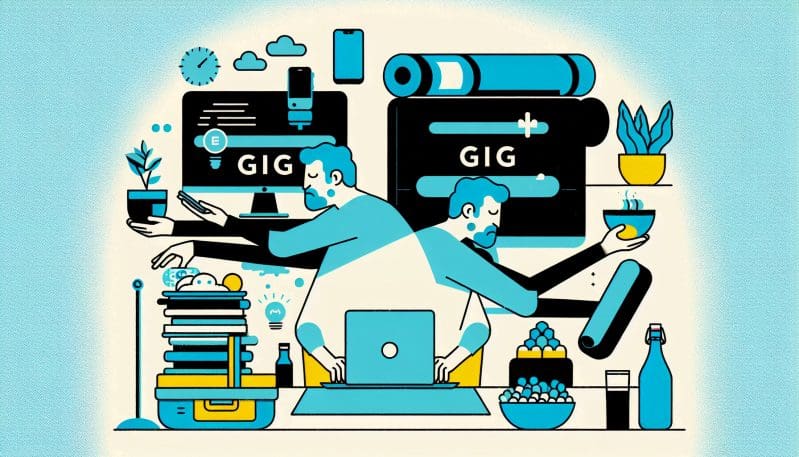The Gig Economy Burnout: Is Self-Care a Feasible Solution or a Band-Aid on a Deep Wound?
- Home
- The Gig Economy Burnout: Is Self-Care a Feasible Solution or a Band-Aid on a Deep Wound?
- Deeksha Joshi
- January 29, 2024
- 0 Comments
The gig economy has ushered in an era where flexibility and autonomy in work seem to be at everyone’s fingertips. The allure of being one’s own boss, with the power to control work schedules, has drawn many into the fold of gig work. However, as the sheen of this seemingly liberating work model begins to fade, a darker reality is emerging for countless gig workers: the tyranny of unpredictable workloads, the anxiety of job insecurity, and the absence of traditional employment benefits that once cushioned workers’ lives. In an increasingly burnout-prone society, self-care has been spotlighted as the antidote to the stresses of modern work. Yet, we must ask ourselves, can self-care really counterbalance the systemic strains placed on gig workers, or is it merely a temporary patch on a deeper, more pervasive issue?
The term ‘gig economy’ encompasses a broad range of jobs, often mediated by digital platforms, where workers undertake short-term, flexible tasks. This work model can offer unparalleled adaptability, but it comes with inherent volatility. Gig workers ride the wave of market demand with little to no safety nets. The instability can lead to erratic work hours, making it challenging to strike a healthy work-life balance, and commonly results in financial stress due to fluctuating income levels. Amidst this scenario, the push for self-care — practices that individuals undertake to manage stress and maintain well-being — sounds promising. It suggests a pathway to resilience amid chaos. However, is it enough?
Self-care, as necessary as it is for individual health and well-being, operates under the assumption that workers have the resources, time, and emotional bandwidth to engage in such practices. For gig workers, these prerequisites are not always available. The sporadic nature of gig work can make it difficult for workers to establish routine self-care practices. Moreover, the absence of employer-provided health benefits places the onus of well-being almost exclusively on the individual, with scant consideration for the structural factors that contribute to their stress and burnout.
There are inherent limitations to self-care within the gig economy. It is not a sustainable solution for systemic issues such as the lack of income stability, the absence of paid leave, or the need for health insurance. A yoga session or meditation might offer temporary relief, but it does not address the root causes of gig economy burnout. True support for gig workers requires systemic change that institutionalizes their welfare as a key aspect of the gig work model. There needs to be a shift from individualized coping strategies to collective responsibility and structural reform.
As an advocate for gig workers’ rights, ‘No Worker Left Behind’ can push for a variety of changes. Here are a few actionable strategies that we propose:
1. Campaign for policies that ensure minimum wage guarantees for gig workers to provide a stable financial floor.
2. Lobby for the extension of health and workers’ compensation benefits to include gig workers, ensuring that they receive the same level of care and protection as traditional employees.
3. Advocate for the right to collective bargaining, enabling gig workers to negotiate the terms of their work collectively.
4. Support the creation of portable benefits that follow gig workers from job to job, respecting their flexible work patterns while providing continuous coverage.
5. Raise awareness about the importance of mental health support for gig workers and work towards making such resources accessible and affordable.
While self-care is an important aspect of maintaining one’s health and productivity, it should not be a substitute for the protections and benefits that foster a truly sustainable work environment. No Worker Left Behind recognizes that to prevent gig economy burnout, we must adopt a dual approach: empower individuals with self-care tools while tirelessly working towards the societal and legislative changes that will ensure gig workers are treated with the equity and respect they deserve. Only by addressing the structural inequities inherent in the gig economy can we move towards a future where flexibility does not come at the cost of well-being.
Choose Layout
Main Color Scheme
- RTL Version
- LTR Version

